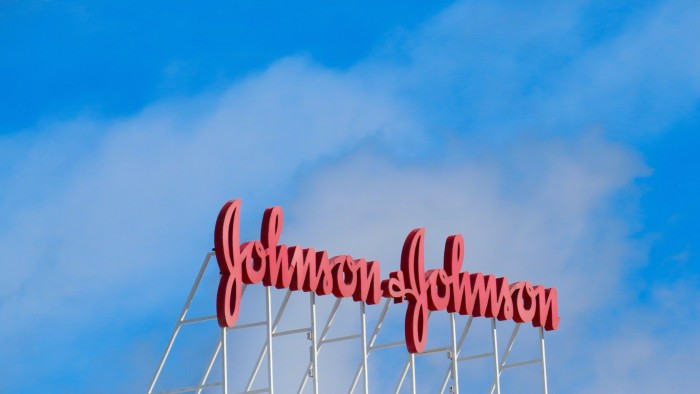Unlock the Editor’s Digest for free
Roula Khalaf, Editor of the FT, selects her favourite stories in this weekly newsletter.
A group action lawsuit against Johnson & Johnson, launched in London’s High Court earlier this month, will have opened many British consumers’ eyes to a stark, and for some, surprising, fact: the US company is no longer the unimpeachable and trusted purveyor of bathroom cabinet staples that it once was.
J&J, and its consumer products spin-off Kenvue, are accused of knowingly peddling baby powder containing asbestos, which caused individuals to develop cancer. In the US, J&J has already sought to settle similar cases. Both companies have repeatedly denied the accusations.
In Gardiner Harris’s brilliant telling, J&J has exploited a deep bond of trust with consumers, forged in the early intimate interactions between parent and baby. The unforgivable betrayal of that confidence is evident in the tale of tainted talc, whose presence and scent were once ubiquitous in homes around the world. It occupies the first section of No More Tears, which was longlisted for the FT and Schroders Business Book of the Year Award.
But Harris, a former New York Times reporter, goes much wider and deeper and he does not pull his punches in his assessment. “For all intents and purposes, Johnson & Johnson was a criminal enterprise,” he suggests. He compares the company to the mafia, based on his chronicling of patient deaths, bribery and illegal drug marketing schemes in the past, but adds “no mafia outfit ever consistently targeted the kind of vulnerable people that J&J exploited”.
Of J&J’s role in the opioid addiction epidemic, Harris writes that J&J should shoulder more of the blame than Purdue Pharma and the Sackler family
Drawing on secret grand jury files and interviews with anonymous whistleblowers, Harris traces, in often distressing and deeply reported detail, the malign influence of what was once described as a “quintessentially American company” over the sale of allegedly unsafe consumer products, prescription drugs and medical devices.
Credibility has been at the heart of J&J’s success, virtually since the Johnson brothers set up the company as a manufacturer of medicinal plasters (the roots of J&J’s trusted Band-Aid brand) in the late 19th century.
More recently, the purpose movement that swept through companies in the 2010s refocused attention on its “credo”, a mission statement first devised in 1943 and carved into stone at its headquarters. Its withdrawal of hundreds of millions of bottles of the painkiller Tylenol in 1982, after a tampering incident that killed seven people, is still cited as a case study in doing the right thing, whatever the cost. Special legislation by Congress makes J&J the only company in the world that can freely use the symbol of the Red Cross on its products.
Harris acknowledges some of the healthcare innovations J&J has brought to the world, from prostate cancer treatments to disposable contact lenses. Yet he describes the credo as “corporate gaslighting on an epic scale”. It supported the notion among staff that J&J was “truly special and good”, and it helped lull regulators and customers, whether doctors or individuals, into believing J&J’s increasingly aggressive sales pitches for dangerous or damaging products.
He finds no evidence that the credo ever changed a strategy or a major corporate decision. As for the Tylenol recall, he suggests the tampering may have been made possible by a breach of J&J’s distribution network, which would make the company less of an innocent victim.

J&J’s role in the opioid addiction epidemic is emblematic. Harris writes that J&J should shoulder more of the blame even than Purdue Pharma and the Sackler family. Their involvement in spreading addictive painkillers, supported by enticements for physicians and academics and unhindered by an ineffective and compromised Food and Drug Administration, has been well-documented, including in some excellent investigative accounts such as Empire of Pain and Dopesick. Unlike some of the Sacklers at Purdue, the Johnsons did not occupy senior roles at their family company after the early 1960s.
In fact, the FDA approved J&J’s fentanyl patch Duragesic five years before Purdue’s OxyContin tablet, and foresaw some of the risks. Yet J&J went on to match many of OxyContin’s hard-sell tactics, and continued selling opioid-based treatments that were open to abuse even after the fatal consequences were obvious. Doctors believed the benefits of opioids, Harris writes, because they were “also being endorsed and propagated by the largest and what many believed to be the most ethical healthcare conglomerate in the world”.
J&J stopped marketing Duragesic in 2008 and later joined other drug companies in settling thousands of US opioid-related claims, contributing up to $5bn without admitting wrongdoing.
Harris’s claim is that J&J has laid down “the most effective smokescreen in capitalism”, with the complicity of regulators, legislators and the media. Litigation and bad publicity have badly dented its once haloed reputation, but No More Tears’ conclusions are muted.
Among other solutions, Harris suggests a clampdown on drug company incentives for doctors and an end to direct industry funding of the FDA. Above all, the J&J story “must lead to a wholesale reassessment of the very system in which the conglomerate was allowed to thrive”. Yet the chaotic healthcare programme of the second Trump administration, which came to office shortly before the book was published, must surely make such a reasoned reassessment even less likely.
No More Tears: The Dark Secrets of Johnson & Johnson by Gardiner Harris, Random House £25/$32, 464 pages
Andrew Hill is the FT’s senior business writer
Join our online book group on Facebook at FT Books Café and follow FT Weekend on Instagram, Bluesky and X

